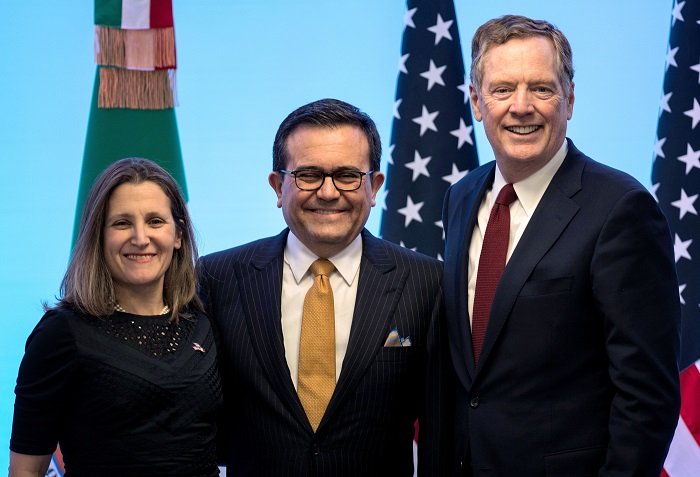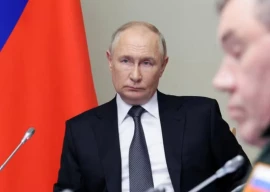
He also criticized the European Union for the trade barriers on US companies and repeated his threat to slap tariffs on European car imports if Brussels retaliates against the steel tariffs.
Speaking as US, Mexican and Canadian trade officials were gathered in Mexico City for the final day of the seventh round of talks aimed at modernizing and modifying NAFTA, Trump doubled down on the threat he made on Twitter early on Monday.
"No, we're not backing down," Trump told reporters following his Oval Office meeting with embattled Israeli leader Benjamin Netanyahu. "There will be tariffs on steel for Canada and for Mexico."
But the US leader who prides himself on his ability to negotiate business deals, and last week said trade wars were "good, and easy to win," said the tariffs could depend on the outcome of the NAFTA talks. Those negotiations that already had hit serious roadblocks over US demands.
‘America First’ policy to have direct implications for Pakistan’s economy
Trump's surprise announcement last week that he plans to impose tariffs of 25 percent on steel imports and 10 percent on aluminum, sparked a fierce global response, including from NAFTA partners Canada and Mexico.
Trade experts and officials in Ottawa and Mexico City raised the possibility the neighboring nations could be exempt from new measures, but the president rejected that possibility and raised the stakes by holding the NAFTA talks hostage to the tariffs.
"We have had a bad deal with Mexico. Very bad deal with Canada," Trump said. "Our factories have left our country, our jobs have left our country. For many years, NAFTA has been a disaster."
And without a deal "that's fair to the workers and the American people," he will terminate NAFTA, he said.
"Tariffs on Steel and Aluminum will only come off if new & fair NAFTA agreement is signed," Trump said in one of a series of morning tweets.
Canada, which has the most to lose as the top source of US steel to the US market, has called the tariffs "unacceptable."
Mexico's Economy Minister Ildefonso Guajardo in a tweet said the threat is "the wrong way to incentivize the creation of a new & modern NAFTA."
Canada, Mexico stick to NAFTA guns despite Trump threats
Despite Trump's tweet claiming there is a large trade deficit with Canada, in fact the United States maintains a trade surplus with its northern neighbor of nearly $8 billion in 2016, and nearly $3 billion in the first nine months of 2017.
The US has a deficit with Mexico that was $63 billion in 2016, and $52 billion in the first three quarters of last year.
Trump administration officials frequently refer to the deficit in goods alone, excluding the offset from dominant US services exports of things like banking and insurance.
Trump ignited fears of a trade war and an outcry from major trading partners with his surprise announcement about the steel and aluminum tariffs, and an even broader threat to impose reciprocal tariffs on all imports from countries that impose duties on US exports.
"People have to understand, our country on trade has been ripped off by virtually every country in the world," even by "people that we think are wonderful," Trump said Monday.
Repeating his concern about the US trade deficit of $800 billion last year, he said "the biggest problem is China."
While Trump said he did not think there would be a trade war, US trading partners already are preparing to retaliate, and have pledged to file a dispute in the World Trade Organization.
French President Emmanuel Macron said Monday the European Union must "react quickly" to US plans that clearly breached WTO rules.
Germany warned against protectionist measures, which it said "would inflict pain" on both sides of the Atlantic.
British Prime Minister Theresa May raised her "deep concern" about the tariffs in a phone call with Trump on Sunday, her office said.
The European Union has said it is drawing up measures against leading US brands like Harley-Davidson and Levi's jeans.
Trump said the EU has "trade barriers far worse than tariffs," and again threatened to "tax their cars" if they go through with their response.
That is just the kind of tit-for-tat reaction that economist warn could spark a trade war at a time when the US and global economies have only recently returned to firmer footing.
The steel and aluminum tariffs were recommended by Commerce Secretary Wilbur Ross after a report from his agency concluded that the glut of the metals on global markets was a threat to US national security.

















COMMENTS
Comments are moderated and generally will be posted if they are on-topic and not abusive.
For more information, please see our Comments FAQ